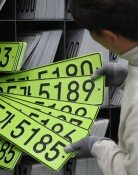Study Reveals Economics Textbooks Are Filled With Biased Viewpoints, Errors
Study Reveals Economics Textbooks Are Filled With Biased Viewpoints, Errors
Posted October. 15, 2005 07:52,
Economics textbooks for primary, middle and high schools were riddled with biased views and a variety of errors, according to a study conducted by university professors.
In particular, many textbooks turned out to contain terms used only by Marxist economists and descriptions which give negative impressions of democracy.
The Ministry of Finance and Economy, along with the Korea Chamber of Commerce and Industry, the Federation of Korean Industries, Bank of Korea, and the Korea Development Institute (KDI) commissioned eight university professors to inspect 114 primary, middle, and high school economics textbooks. The ministry announced on Friday that 446 parts in the textbooks examined needed corrections.
The number of fallacies or problems that were found was 64 for elementary school textbooks, 87 for middle school textbooks, and 295 for high school textbooks.
Wrong concepts or incorrect descriptions topped the list of types of errors with two hundred cases, followed by biased views or non-mainstream economic interpretations with 23 cases, and negative descriptions of the market economy system with 19 cases.
The Ministry of Finance and Economy plans to revise the textbooks to correct the mentioned problems next year, after consulting with the writers of the textbooks.
Biased Views-
A high school economics textbook said, The 80/20 rule on income and wealth concentration has a lot to do with the polarization in consumption Even though it is an inevitable outcome of the neo-liberalism policy, it can cause problems in our society. The textbook continued on to say, People could no longer enjoy unfettered freedom as the democratic society in the late 19th century began to experience an increasing number of problems caused by monopolistic capitalism, such as concentrated wealth, unemployment, and fluctuations in the economic cycle.
Kim Jong-suk, an economics professor at Hongik University who led the textbook inspection team, said, Its claim that the 80/20 society was an inevitable outcome of neo-liberalism sounds like Communist propaganda. Monopolistic capitalism, a concept introduced by Marxist economists, is not used in mainstream economics.
A high school economics textbook says, The former administration of Park Chung-hee is an infamous example of development dictatorship Economic development driven by the government often results in a number of problems including cozy relations between business and politics, corruption, and the violation of workers human rights.
The textbook inspection team criticized this view, saying There are mixed views on former president Park. So the fact that the textbook labels him as an exemplary dictator shows that it is influenced by the writers personal opinion.
There are also descriptions which barely make sense. Some book argues that it is selfish to eat out with family members.
Anti-Market and Anti-Corporate Perspectives-
One high school economics textbook explained, It is a prevailing view that faulty social systems cause poverty. It insists that the poor can never get rich, no matter how hard they try. And it blames the democracy for that.
Another high school economics textbook says The market economy is characterized by excessive competition and inhumanity in the sense that it creates a society where money, not people, decides the results of elections.
Many skeptical views on large conglomerates have also been revealed.
One sociology textbook for high school freshmen argues, Most importantly, we need to reform Chaebeol, or family-owned large conglomerates, and support small- and medium-sized companies. It goes on to insist, Businessmen outlive their businesses.
Even Basic Principles Are Wrong-
One high school economics textbook explains, Wages tend to rise when there is more supply than demand in the labor market. But in fact, when supply exceeds demand, wages usually go down.
Another sociology textbook for high school freshmen says, Higher consumer prices bring down the value of currency, leading to increased consumption. But in fact, a rise in consumer prices forces consumers to tighten their belts.
Some textbooks even confuse GDP with per capita income, while others oversimplify complex economic principles.
Ki-Jeong Ko koh@donga.com
Headline News
- N. Korea launches cyberattacks on S. Korea's defense companies
- Major university hospital professors consider a day off each week
- Italy suffers from fiscal deficits from ‘Super Bonus’ scheme
- Inter Milan secures 20th Serie A title, surpassing AC Milan
- Ruling and opposition prioritize spending amid tax revenue shortfalls







